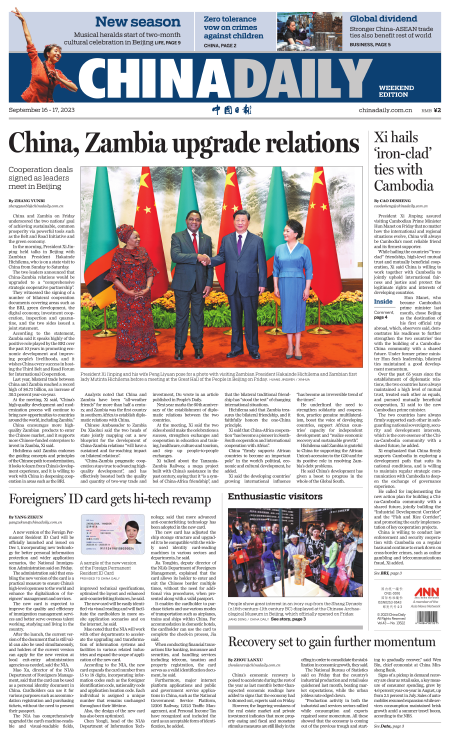China's economic recovery is poised to accelerate during the rest of the year as last month's better-than-expected economic readings have added to signs that the economy had bottomed out, experts said on Friday.
However, the lingering weakness of the real estate market and private investment indicates that more property easing and fiscal and monetary stimulus measures are still likely in the offing in order to consolidate the stabilization in economic growth, they said.
The National Bureau of Statistics said on Friday that the country's industrial production and retail sales quickened last month, beating market expectations, while the urban jobless rate edged down.
"Production activity in both the industrial and services sectors rallied while consumption and exports regained some momentum. All these showed that the economy is coming out of the previous trough and starting to gradually recover," said Wen Bin, chief economist at China Minsheng Bank.
Signs of a pickup in demand recovery are clear as retail sales, a key measure of consumer spending, grew by 4.6 percent year-on-year in August, up from 2.5 percent in July. Sales of automobiles resumed expansion while services consumption maintained brisk growth amid a summer travel boom, according to the NBS.
Recovering market demand has boosted production in the automobile, electronics and other equipment manufacturing sectors, driving growth in industrial output, which expanded by 4.5 percent in August on a yearly basis after a 3.7 percent rise in July.
With the data indicating that policy measures to boost domestic demand are gradually taking effect, both Chinese equities and the renminbi rallied. The onshore renminbi touched a two-week high of 7.24 per US dollar in morning trading, although it gave up most of the gains later on Friday.
Chen Dong, head of Asia macroeconomic research at Pictet Wealth Management, said the improving statistics have strengthened his belief that the Chinese economy may recover moderately in the second half of the year and achieve full-year growth of 5.2 percent, fulfilling the annual target.
Nevertheless, the NBS data pointed to the lingering challenge of the property market downturn, with NBS spokesman Fu Linghui acknowledging that the real estate market is still undergoing a correction.
In the January-August period, fixed-asset investment grew by 3.2 percent year-on-year, down 0.2 percentage point from the first seven months, dragged by an 8.8-percent drop in real estate development investment.
Lu Ting, Nomura's chief China economist, said the recent raft of supportive measures in the property sector may not be enough to turn things around, and the government still needs to ramp up policy support to deliver a more sustainable recovery.
Private investment also remained subdued, edging down 0.7 percent year-on-year in the first eight months, compared with a 0.5-percent drop from January to July, according to the NBS.
Noting that domestic demand remains insufficient while pressure remains in the job market, Fu said the country will ensure effective implementation of the supportive policy measures to consolidate the foundation of economic recovery that is not yet solid.
In a sign that policymakers are ramping up stimulus measures, the People's Bank of China, the nation's central bank, cut the amount of money that banks must keep as reserves on Friday, releasing more than 500 billion yuan ($68.7 billion) in liquidity.
zhoulanxv@chinadaily.com.cn

